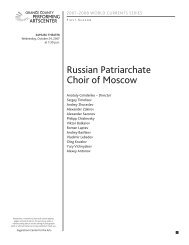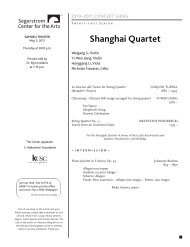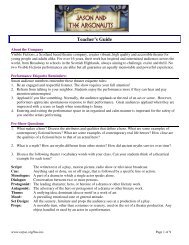SPRING AWAKENING - Segerstrom Center for the Arts
SPRING AWAKENING - Segerstrom Center for the Arts
SPRING AWAKENING - Segerstrom Center for the Arts
Create successful ePaper yourself
Turn your PDF publications into a flip-book with our unique Google optimized e-Paper software.
ights. In 1895 she co-drafted a petition <strong>for</strong> <strong>the</strong> abolition of <strong>the</strong><br />
Law of Association prohibiting women from joining political<br />
organizations and is credited as primary organizers of <strong>the</strong> Union of<br />
Progressive Women’s Associations established in 1899.<br />
Raised in a middle class home much like that of <strong>the</strong> characters<br />
in Spring Awakening, Emma Trosse was one of <strong>the</strong> first women<br />
admitted to attend lectures as a guest at <strong>the</strong> Friedrich Wilhelms<br />
University of Berlin. There is no evidence she was ever allowed to<br />
become a full time student. Yet she did become a teacher. It is safe<br />
to assume as eventual head of a boarding school she was nothing<br />
like her counterpart in <strong>the</strong> play, <strong>the</strong> rigid headmistress.<br />
Minna Cauer<br />
The expansion of education, entertainment, and access to<br />
newsreels brought in<strong>for</strong>mation about progressive social<br />
movements to <strong>the</strong> masses. Fleeing a seriously exploited landscape,<br />
large populations emigrated from <strong>the</strong> rural German countrysides<br />
to its cities, where literacy promoted new ideas about personal<br />
freedom. While people still respected and looked to parents <strong>for</strong><br />
guidance, <strong>the</strong> idea that children’s perspectives on important topics<br />
should necessarily mimic <strong>the</strong>ir <strong>for</strong>bearers’ was quickly becoming<br />
extinct.<br />
Along with social and cultural re<strong>for</strong>ms Germany was becoming<br />
a world industrial power as well. Through <strong>the</strong> mid-19th century,<br />
Britain had dominated economically and militarily. In <strong>the</strong> late<br />
1800s, however, things were about to change. By <strong>the</strong> end of <strong>the</strong><br />
century Germany, with its burgeoning military/industrial complex,<br />
had overtaken it and would soon become <strong>the</strong> greatest power on<br />
<strong>the</strong> continent. World Wars I and II are traced by some historians<br />
to this period.<br />
Emma Trosse<br />
While all of this captured <strong>the</strong> imagination of sophisticated city<br />
residents, older rural Germans left behind clung tightly to traditional<br />
ways. Their children, however, were very much aware that<br />
something exciting was going on beyond <strong>the</strong> narrow confines of<br />
<strong>the</strong>ir village. It is in this setting that Frank Wedekind, author of <strong>the</strong><br />
original 1891 play, Spring Awakening, placed his characters. Born in<br />
Munich, a center of progressive thinking, his work often criticized<br />
middle class attitudes toward sex and <strong>the</strong> repression of German<br />
youth. Considered too suggestive <strong>for</strong> <strong>the</strong> <strong>the</strong>atre, <strong>the</strong> play was not<br />
per<strong>for</strong>med until 1906; large sections of it were cut by censors.<br />
The topics addressed in <strong>the</strong> play and <strong>the</strong> musical are timely even<br />
today—teen sex, suicide, incest and child abuse, abortion and <strong>the</strong><br />
general difficulties confronting adolescents in an adult controlled<br />
world. If history indeed repeats itself, <strong>the</strong> story is a mirror of its<br />
times—<strong>the</strong>n and now.<br />
11
















